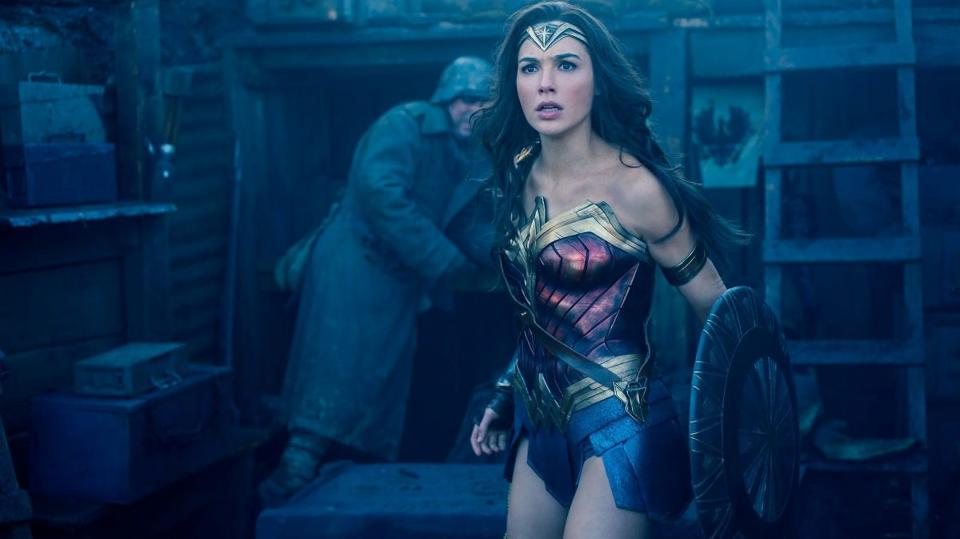
This review of the new Wonder Woman comes to us from Caleb Ackley.
Typically when I hear the words ‘summer’ and ‘blockbuster’ uttered in the same sentence, a shudder runs down my spine. Forehead wet with anxiety-induced sweat, I try with every ounce of strength I possess to keep from imagining the latest franchise subjected to the dreaded ‘reboot’ or, worse still, the newest installment in an ever-widening and ever more deafening Transformers universe. This summer, however, thanks to a certain female superhero, change was in the air, and when that fateful weekend in June finally came, I ran to the theatre, bought my weight in overpriced candy, and settled in.
Thinking back to what I remember from Lynda Carter’s Wonder Woman of the late 70s, there was little, aside from costume and physique, that left a lasting impression. Complete with a waspish waist, copious amounts of cleavage, and a peppy theme-song, the original TV show, while certainly putting a powerful woman center-stage, did little to detract from the culturally ‘feminine’ tropes of the day. Enter Patty Jenkins.
Jenkins’ direction of Wonder Woman while itself masterful is a first on multiple fronts. She is now not only the first female director to direct a superhero (heroine?) blockbuster, but also claimed the top spot for highest-grossing opening of a female-directed film. Triumphs to be sure, but the real victory comes in her careful direction of this new classic which doesn’t simply impose a masculine standard on a feminine shape, but rather takes on a form all its own.
Wonder Woman finds its strength in its unflinching look at the atrocities of war, while at the same time portraying the Amazonian heroine as a truly feminine character facing those same atrocities. This is no easy balance to strike, especially given the darkness of the context in which Princess Diana finds herself. So, while the genre of ‘superhero franchise’ has over the years undoubtedly become much darker in its tendencies, this new vision for Wonder Woman, while not denying pain, also offers its viewership just as much hope.
Diana, when we meet her, while having been raised by her mother in the company of strong (if not mostly white) women, has been largely sheltered from grief and darkness. Her first introduction to the world of men is heartbreaking, as she, for the first time, witnesses death. As a result, Diana’s conscience cannot rest until action is taken to protect those who cannot protect themselves. She decides to offer her aid in the war effort and partners with an American pilot, played by Chris Pine, to join the fight. It is there, at the war’s front lines, that Gal Gadot’s performance makes its most enduring mark. Walking through the ranks of the wounded, dying, and desperate, she rushes from one hurt to the next. Her compassion is pure, and her anger is righteous. She sees every hurt in its brutality and horror, and refuses to accept it as the status quo. This theme is traceable in the arc of the film as Diana experiences victory, heartache, disappointment, and even her own inability in the face of suffering. The question of culpability also plays a major role. Who is to blame for the war? Men? Something greater? Assuming that men will make the honorable choice if simply given the opportunity, this hope is also shattered in an exchange with Chris Pine’s character, Steve; ‘What if we’re all to blame?’ Steve says. ‘I’m not,’ Diana responds. ‘But maybe I am,’ says Steve.
The understanding of shared guilt is a heavy burden to bear, but is carried in tandem with the understanding of mankind as something that, while fundamentally broken, is at the same time intrinsically worth a great deal. Diana, when presented with the choice to either abandon humanity or fight in their stead, takes the heroic, and wonderfully predictable, stance. Fighting on behalf of those without strength, she defeats their oppressor, and vows to always protect those she loves most. Rather than simply brushing their guilt under the rug, she shoulders it, bearing the weight on her back even as it threatens to undo her. This picture of a savior, while not foreign to many of us, was a sight to behold and one well worth our collective attention. In a culture and time pre-disposed to the loathsome, this new hero is a welcome sight, worthy of not only our sons and daughters’ respect, but of ours as well.

COMMENTS
Leave a Reply













